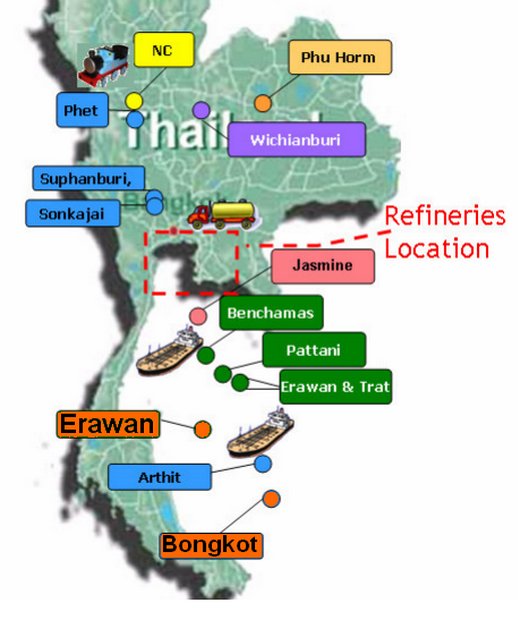The energy policy maker has decided to open new bids for two offshore petroleum blocks following pressure from energy reform advocates.
The National Energy Policy Council (NEPC), chaired by Prime Minister Prayut Chan-o-cha, decided Monday to open new auctions for two petroleum blocks in the Gulf of Thailand -- Erawan and Bongkot -- the concessions for which are due to expire in 2022 and 2023, respectively, said Energy Minister Anantaporn Karnchanarat after a meeting.
In the event there are no bidders, the ministry will negotiate with the blocks' existing concessionaires as an alternative.
The framework for the bids will be conducted within a year, he said.

Petroleum production blocks Erawan and Bongkot expire in 2022 and 2023 respectively. They will be up for auction under the revised plan of the prime minister's National Energy Policy Council. (Map courtesy PTT Pcl)
The move came after the civic group, the People's Network for Energy Reform (PNER), on Sunday opposed a government proposal to negotiate with the existing concessionaires for new contracts without setting new bids as a priority.
They called on the government to open new bids for the contracts.
Previously, Gen Anantaporn said that his ministry had proposed to the NEPC two different options to manage the petroleum fields.
First, negotiate with existing concessionaires for new contracts; and second, open new bids for the concessions.
The Erawan block with current gas production of 1,240 million standard cubic feet per day (MMSCFD) has been operated by Chevron Exploration and Production Thailand Co.

The Bongkot block with 840 MMSCFD is operated by PTT Exploration and Production Plc (PTTEP).
Gen Anantaporn said the bidding process will start in the third quarter of this year after the amended version of the Petroleum Act takes effect.
"If we can do it as planned, the names of the winners will be ready to be announced by the middle of next year," said Mr Anantaporn.
He added, however, that if the two blocks attract no newcomers to the auction, the government will negotiate with existing concession holders for new contracts.
After the meeting, Prime Minister Prayut Chan-o-cha said the government is doing its best to build and ensure energy security for the country.
Challenges include how to efficiently manage the country's energy resources, improve existing laws and plan investments to supply energy in line with economic development, he said.
Veerasak Pungrasamee, director-general of the Department of Mineral Fuel, said if the concessions are transferred to new operators, a disruption in gas production might occur and result in output falling to between 1,000 and 2,000 MMSCFD during the transition.
Ending the Erawan field's concession has become a hot issue after the PNER made its fears public that the government would quietly negotiate with existing licence holders rather than opening the bidding process to competitors.
The activists also called for the energy policy maker to have a relationship with the concessionaires in which production, rather than profit, is shared.
Thirachai Phuvanatnaranubala, a key member of the PNER and former finance minister, on Monday thanked Gen Prayut for choosing to put the blocks up for auction.
"With this, the people can be assured the country will gain the most," Mr Thirachai wrote on his Facebook.
The ex-finance minister also called on the Energy Ministry to reveal to the public as soon as possible draft terms of the auction to invite diverse opinions on the process.
According to Mr Thirachai, energy reform advocates agreed with the Energy Ministry on the country's need to ensure energy security and to avoid disrupting production.
He said the group had suggested the ministry select four or five blocks for auction but its suggestion was ignored.
He also warned the amendment to the Petroleum Act would be delayed if authorities failed to pay heed to objections, particular on production sharing.
Somporn Vongvuthipornchai, president and chief executive officer of PTTEP, said the company is ready to put forward new bids and negotiate directly with the government. However, the company is waiting to find out the details of the bidding framework.

Opponents including energy policy activist ex-senator Rosana Tositrakul say the government's energy policy will not lead to national security. (Photo by Kitja Apichonrojarek)